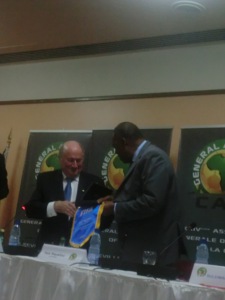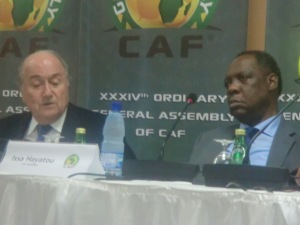by Satish Sekar © Satish Sekar (February 5th 2015)
Travesty
The international career of Mauritian referee Rajindraparsad Seechurn is all but over. His performance in the quarter-final between hosts Equatorial Guinea was far below the required standard. Seechurn has paid the price. Although the headlines were dominated by one very soft decision – the injury time phantom penalty – there was much more.
The Confederation of African Football (CAF) has suspended him for six months over his performance in this match. He has also been removed from CAFʼs list of top African referees, which to all intents and purposes ends his international career. It was a baffling performance, but the Carthage Eagles contributed to some of their misfortune.
Tunisia made the mistake of making their superiority tell. They were better on paper, in FIFAʼs rankings and on the pitch too. The hosts were there for the taking, but Tunisia bided their time, deservedly taking the lead midway through the second half.
Robbed
They were coasting to victory. But then the referee intervened and the timing raised eyebrows too – injury time had just begun. The hosts were going out without looking like scoring until gifted an utterly undeserved lifeline. Substitute Ivan Bolado fell over in the penalty area. Defender Hamza Mathlouthi had challenged him. To the consternation of the Tunisians, Seechurn gave a penalty.
Before former Real Madrid prospect Javier Balboa converted the penalty – he doesnʼt want to talk about the award of it, just that he had pressure on him and still had to score it – a green laser was clearly shone at the eyes of Tunisian goal-keeper Aymen Mathlouthi.
So extra time began. The appalling decision affected the Tunisians. They clearly felt that Seechurn would not give any decision in their favour – with cause – as clear fouls were ignored. The time-wasting, especially by Equatorial Guineaʼs goal-keeper Felipe Ovono Mbang, was outrageous.
Enraged
Seechurn made no effort to control it or sanction it with a yellow card. Instead, he allowed the hosts to run the clock down. Adding insult to injury he allowed a ludicrous two minutes added time, much of which was wasted by a brawl caused by the hostsʼ bench refusal to return the ball for a throw in. Seechurn did not even allow the added time to be completed – ending the match a few seconds early.
The Tunisians were understandably incensed. They chased the referee, who was protected by security police, which prevented the enraged Tunisians from getting to Seechurn. In addition to the sanctions against Seechurn, CAF have punished the Carthage Eagles, fining them $50,000 and demanding an apology – no individual players were punished. Equatorial Guinea were punished for the poor security.
Solutions
Seechurnʼs career at the top level of African football is over. Good. His performance in this match alone – thereʼs no shortage of complaints about his refereeing in other matches too – was so abysmal that he should not officiate at élite level again. Arguably he should not be trusted at any level. His decisions defied logic.
But there was a simple solution that could have delivered the correct decisions in actual time. It could have been referred for a video review. As the match had already stopped due to the decision anyway it would not have affected the flow of the game. Examining the footage would have shown that it was not a penalty and the match ends differently. There is no extra time and no further injustices and no ugly scenes that followed.
A review system such as used in cricket or tennis where decisions can be appealed could also be used at least in cases where the game has stopped. Conceding the use of goal-line technology – only used in some matches – while refusing to review absurd decisions like the phantom penalty is absurd and will inevitably lead to injustice.
The use of available technology could and should have prevented the shameful scenes in Bata. There is no longer any credible reason not to make full use of it.


